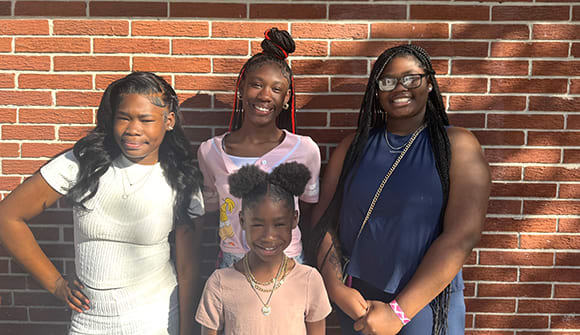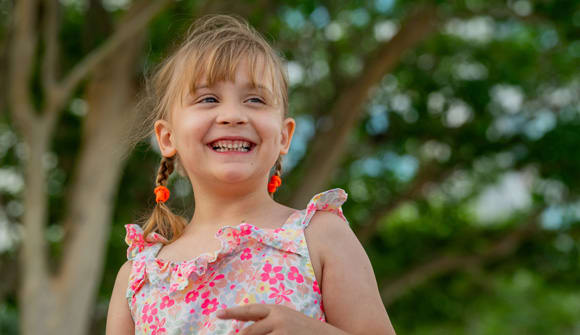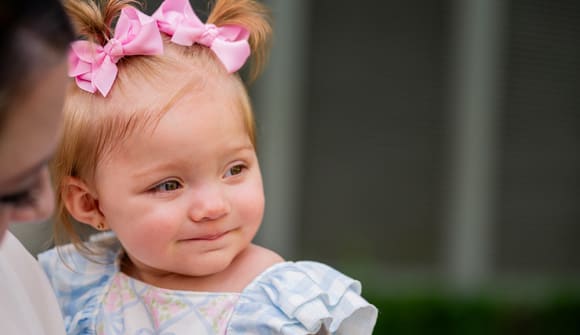Ear-itated
Sound advice for preventing and treating ear infections in kids.
Article Date:

Ear infections are a common childhood condition and probably one of the most miserable afflictions for everyone in the household. As any parent who has had a child suffer from the ailment knows, there can be a lot of crying and discomfort involved.
According to Evie Landry, MD, pediatric otolaryngologist (ENT) at Wolfson Children's Hospital and Nemours Children's Health, Jacksonville, babies as young as 4 to 6 months can experience an ear infection. Generally, they occur in the first couple of years of life and then improve as children age.
What causes ear infections in children?
“School and daycare often expose children to more respiratory illnesses and sinus issues, which can make little ones more prone to ear infections,” Dr. Landry said. “Most children outgrow ear infections over time, and it’s rare for infections to persist into adolescence.”
Ear infections often result from another illness – cold, flu or allergies – that causes congestion and swelling of the nasal passages, throat and eustachian tubes, which drain fluid produced by the ears to the back of the nose.
"In young children, the eustachian tubes are shorter, smaller and flatter, and the muscles are still developing. Additionally, babies spend much of their time lying flat, so gravity doesn’t help drain the fluid. As a result, fluid can remain in the ear, raising the risk of infection," explained Dr. Landry.
Dr. Landry said, "Signs of ear infections may include fever, tugging at the ears, nausea, vomiting, crying, irritability, lethargy and ear drainage in younger children. Older children may describe pain, a sense of fullness inside the ear or muffled hearing."
How to treat ear infections
In most cases, ear infections are easy to treat in one of three ways:
- Antibiotics typically resolve the infection within five to 10 days. The medicine is most commonly taken by mouth. Drops may be used if there is drainage from the ear or the child already has ear tubes.
- Pain medications alleviate some discomfort that causes fussiness, difficulty sleeping or crying. After consulting with their child’s pediatrician, caregivers can give weight-appropriate doses of acetaminophen or ibuprofen.
- Ear tubes are reserved for children with three or more ear infections in six months, four or more in a year, persistent fluid in the ear for three months or hearing loss.
"Placing ear tubes is the most common procedure in the United States, with about 1 million cases performed annually," said Dr. Landry. "It's a 5- to 10-minute outpatient procedure. A typical set will stay in place about 12-18 months, and the vast majority will fall out on their own."
According to Dr. Landry, almost every child will have an ear infection before age 2. Most are managed well with antibiotics.
“Children with recurring infections, persistent fluid in the ears or speech issues related to hearing loss are often referred to a specialist," she said.
Risk factors and prevention
Some unavoidable risk factors for ear infections include family history, frequent illness, immune deficiency and chronic respiratory diseases.
Don't despair. There are things you can do to help prevent ear infections:
- Avoid second-hand smoke: Make sure your child is breathing healthy air.
- Breastfeed: Studies have shown breastfed babies are less likely to suffer from ear infections.
- Feed babies at an upright angle: When bottle-feeding, hold baby's head higher than his or her stomach to keep the formula and other fluids from flowing back into the eustachian tubes.
- Take a break from daycare: If your child is in daycare for social reasons rather than work necessity, a short break can reset the system, help your child recover from respiratory illnesses and get the ears back on track.
Concerned about your child's ear infection?
Wolfson Children's Hospital provides pediatric otolaryngology (ear, nose and throat) services in collaboration with Nemours Children's Health, Jacksonville. Click here to learn more.



